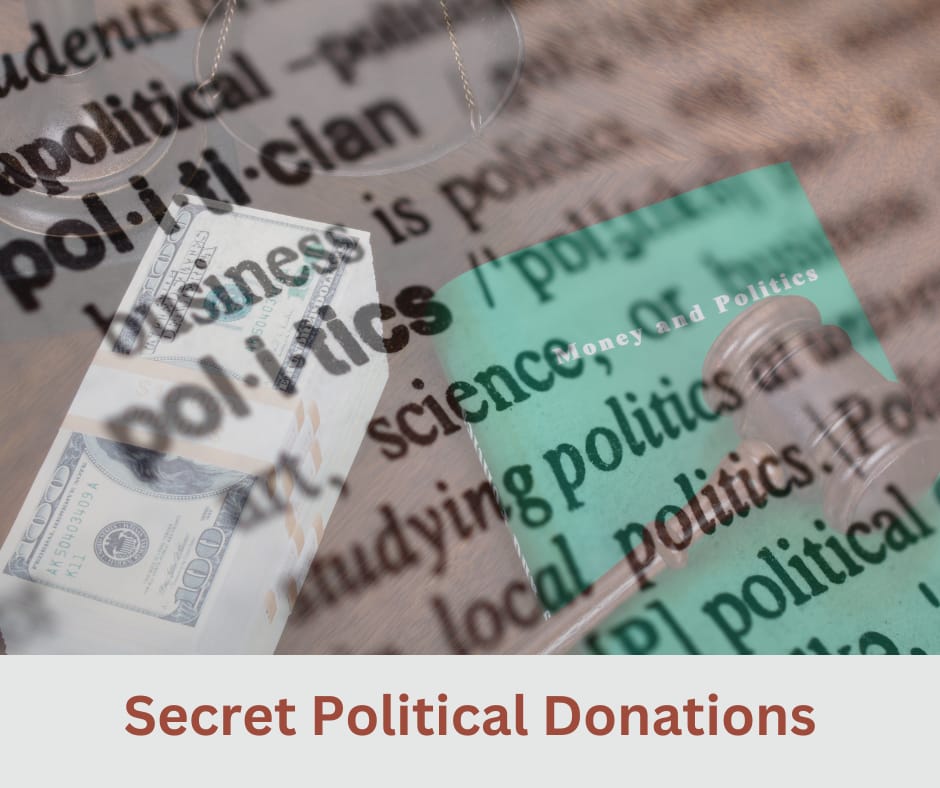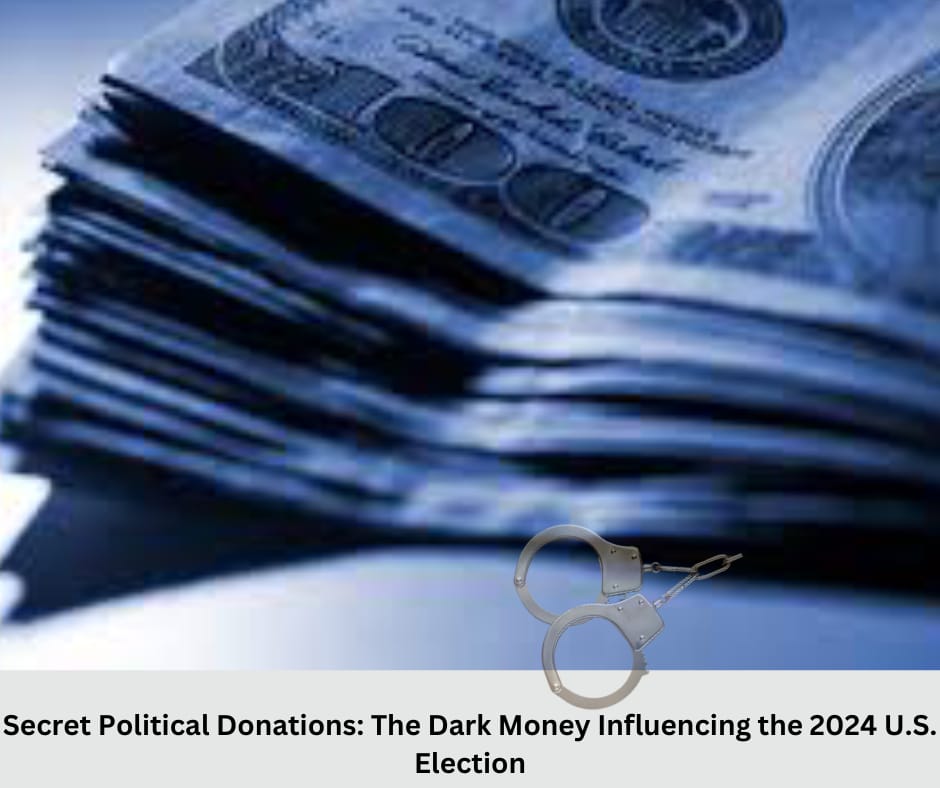Physical Address
304 North Cardinal St.
Dorchester Center, MA 02124

INTRODUCTION
Money has always played a significant role in U.S. Elections, but in recent years, the emergence of dark money has highlighted a Secret Political Donations particularly questionable source of influence. This term describes spending made by groups that are exempt from disclosing the sources of their funding.
Historically, this kind of financing has affected elections because affluent individuals, businesses, and special interest organizations have utilized their funds to fund Secret Political Donations candidates and initiatives behind closed doors. With the US election approaching in 2024, the potential for dark money to sway democracy appears more serious than ever.
It’s critical to understand how these covert Secret Political Donations contributions may affect the results of the next election, given the mounting concerns about election integrity and the power of affluent elites. This article will investigate the ways in which dark money operates, identify some of the prominent covert contributors influencing the 2024 US election, and consider the wider ramifications for democracy.

Secret Political Donations expenditures conducted by non-profit groups excluded from donor disclosure rules, such as trade associations and social welfare organizations with 501(c)(4) status, are referred to as “dark money.”
These organizations are allowed by law to accept unlimited amounts and spend large sums of money in support of particular candidates or Secret Political Donations initiatives. It is because these organizations are voluntary and not obligated to state where their funding originated so it is difficult to know who sponsors which program or even candidate. One of the reasons money is a topic of discussion is its opaque nature.
Voters find it challenging to determine whose interests candidates are advancing when they are unaware of the identities of the individuals contributing to campaigns or commercials. This causes a democratic imbalance. with a small number of powerful individuals or organizations running the Secret Political Donations apparatus and swaying decisions to serve the interests of specific parties over the interests of society as a whole.
Loopholes in the United States campaign finance laws enable the smooth operation of money. Although the Federal Election Campaign Act and subsequent rulings such as Citizens United v. FEC have set certain limits and reporting obligations for political contributions, dark money groups have discovered ways to bypass these regulations.
For instance, 501(c) groups are technically barred from making politics their main focus yet many actively participate in spending while still upholding their tax-exempt status. Moreover, these entities can contribute to Super PACs that must reveal their donors creating a complex network of financial ties, that conceals the true origin of the funding.
As the 2024 election season kicks into gear the flow of dark money into races nationwide is already underway. Some of the largest undisclosed Secret Political Donations donations originate from prominent yet secretive organizations. Traditionally entities such as Americans for Prosperity backed by the Koch brothers and the Sixteen Thirty Fund, a progressive organization have significantly impacted elections through their covert contributions. While their influence persists in the 2024 election cycle new participants and tactics have also emerged.
One trend that has been reported in the last few years was the growing use of donor advised funds (DAFs). Using these funds, one can support charitable organizations without exposing his identity. Secret Political Donations DAFs have emerged as the vehicle of choice for high net worth campaign contributors desiring to influence elections covertly.
DAFs have become a preferred instrument for affluent Secret Political Donations donors seeking to sway elections discreetly. Several recent investigations have shed light on how these funds are utilized to funnel millions of dollars into dark money groups supporting both Republican and Democratic candidates. Moreover, recent revelations and whistleblower testimonies have shed light on the clandestine realm of undisclosed political contributions.
For example, there are indications that donors are finding avenues to channel funds into U.S. elections via shell companies and non-profit entities. Secret Political Donations Although American law prohibits nationals from directly supporting campaigns these loopholes enable foreign influence to infiltrate the political landscape raising questions about national sovereignty and the integrity of elections.
One of the most prominent ways that money shapes U.S. elections is through campaign commercials. Secret Political Donations advertisements, particularly in swing states are frequently backed by dark money organizations that conceal their true sponsors. These commercials can vary from attack ads targeting specific candidates to issue centred promotions that subtly advance one party’s agenda over another. Since the groups financing these advertisements are not obligated to reveal their contributors voters are left uncertain about the true origins of the messaging.
Dark money doesn’t just impact campaign ads; it also influences how the media portrays stories and shapes public conversations. Numerous dark money organizations support think tanks, research centres and media platforms that create content aimed at swaying public sentiment. By presenting issues in a light or directing attention towards specific subjects these entities can subtly shape voters perceptions without the transparency associated with traditional campaign funding.
For instance, during the 2020 election dark money groups allocated substantial funds towards advertisements and social media initiatives targeting voter demographics. These campaigns aimed to tailor messages to voters with the intention of influencing their views or encouraging them to vote in a certain manner. Similar tactics are being employed in the 2024 election as dark money entities invest significantly in digital promotions that reach voters through their social media feeds and preferred online news outlets.
The impact of money in the upcoming election extends beyond swaying opinions; it also significantly affects policy decisions. When candidates secure support from hidden contributors they might feel obliged to cater to those donors’ preferences.
This could result in choices that prioritize the interests of a select group rather than addressing the needs of the majority worsening inequality and eroding democratic responsibility. For example, covert funding can sway not just election outcomes, but also the priorities set by lawmakers once they take office. Hidden contributions can support lobbying activities aimed at pushing for less regulation, tax breaks for the affluent or rolling back environmental safeguards. These policies may serve the interests of a select group of influential donors while adversely impacting the public.
The significant impact of money on shaping the legislative agenda raises concerns about the equity and responsiveness of the political system. Moreover, dark money can exacerbate divisions. When wealthy benefactors back candidates or organizations with views it pushes discussions further towards the extremes. The influence of money through ads and divisive language contributes to a political atmosphere where compromise and cooperation become extremely challenging.
The amount of money flowing into political campaigns as the Secret Political Donations 2024 election draws near, prompting worries about a decline in public confidence in democracy. Though the public supports transparency broadly, real improvements seem unlikely given that both major parties stand to gain from these payments.
The democratic process is under danger due to the increasing influence of money in American elections. Covert contributions skew voter attitudes and campaigns, making it harder to distinguish between doing good deeds and chasing personal benefit. Without major adjustments, this trend of using dark money to influence the 2024 election is projected to continue, endangering the credibility of American democracy.
Congress has resisted reform proposals like the DISCLOSE Act, which would have required dark money organizations to reveal their funders. Partisan differences also impede the Federal Election Commission (FEC), which is in charge of monitoring campaign money, from enacting new legislation or enforcing existing ones.
It is worth confirming that although the campaign finance law is far from being perfected, one thing is through and through clear: elections in the USA must be open to scrutiny. Without comprehending the origin of campaign contributions and their significance in making policy, voters will hardly be able to engage in any constructive action on Election Day.
Nonetheless, stemming the tide of dark money in the politics of the country is fundamental to upholding its democratic ideals. Unsurprisingly, as Secret Political Donationsampaigns for the next elections ramp up, bridge building between Secret Political Donations voters and their representatives is crucial. So is the fight for reconstruction of the American system of government that is predominantly so much money driven.